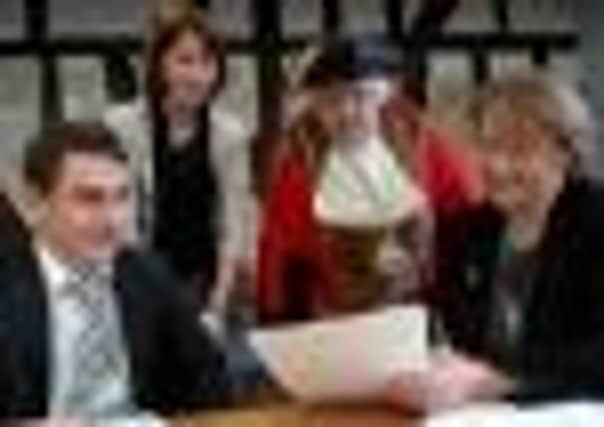Sexism out to pasture as Sarah takes place in history


Since 1836 there have been annual elections for the role of pasture master, but until the law changed last year only men could stand or vote.
That changed yesterday when, amid the ornate surroundings of Beverley’s Guildhall, Sarah Walker was elected the first female pasture master in the organisation’s 177-year history.
Advertisement
Hide AdAdvertisement
Hide AdThe election followed quaint tradition – being called to a close at just before 11am after a 20-minute lapse in voting.
Refreshments – including pints of bitter and a bottle of whisky – were also offered at the event, a tradition apparently left over from the old days when people were bribed to vote for candidates.
Miss Walker, 39, and an NHS manager, is following in family tradition.
Her father Trevor was re-elected alongside her as pasture master yesterday. Her brother Neil was also re-elected as pasture master.
Advertisement
Hide AdAdvertisement
Hide AdMiss Walker, who is getting married in a fortnight’s time, said: “I am absolutely ecstatic and quite shocked.
“It is a real honour. It’s been a family tradition, I’ve grown up with it, and I absolutely adore the Westwood.”
The pasture masters’ main role is to act as custodians of Beverley’s three areas of common land, Westwood, Swinemoor and Figham, some 1,200 acres in total, encompassing popular walks, a racecourse and golf course.
Unsuspecting visitors may find cattle licking paint off cars parked on the Westwood or knocking off their wing mirrors – but they cannot make a claim as the animals there have the right of way. Freemen can graze animals on the pastures – although none does – but in times gone past it was a useful source of income.
Advertisement
Hide AdAdvertisement
Hide AdBut at least 15 farmers graze stock on the Westwood and there are many horse owners who pay the so-called “gait fee” to allow their steeds to feed on Swinemoor.
The pastures’ administrators had fought for three decades for a change in the law, concerned that if they didn’t act the tradition could literally die out, because the title could only be passed down through the male line.
After the town’s maternity unit closed, numbers of freemen dwindled.
About four years ago the pasture masters persuaded East Riding Council to get involved, saying they would pick up the costs if the council agreed to proceed and promote a local bill.
Advertisement
Hide AdAdvertisement
Hide AdThe Local Democracy, Economic Development and Construction Act 2009 came into effect last January, allowing daughters to follow in their fathers’ footsteps. It was swiftly followed by a second act, promoted by Beverley pasture masters, to extend the boundaries beyond Beverley to Molescroft and Woodmansey.
Numbers of freemen – who are allowed to vote for the 12 pasture masters – have exploded since the change in the law. There are now more than 200, including 75 women, eight of whom took part in yesterday’s vote.
The election took a shade under two hours – half an hour longer than usual – in an atmosphere more akin to a drinks party.
Keeping an eye on the clock and a tab on the vote was civic officer Sarah Asquith, and unlike usual elections, the votes were open to see as they came in.
Advertisement
Hide AdAdvertisement
Hide AdChairman of the pasture masters Chris Thompson, a freeman for 59 years, including 39 years as chairman, was delighted to see four female candidates standing – although his daughter Christine Gibbon failed to be voted in as a pasture master.
Mr Thompson, 80, said: “I’m elated – it’s keeping us going because we were a dying race, we were on our way out.”
Vice chairman Allan English – who has been part of efforts to bring in women since he joined 28 years ago – said: “My sole purpose is that it remains a pasture. I just hope it carries on and on.
“No matter what, it’s ours to graze.
“On the Westwood there’s a racecourse, a golfcourse and people go running there.
“We’ve had circuses on there, we’ve had all sorts.
Advertisement
Hide AdAdvertisement
Hide Ad“Until 10 years ago we had 130 racehorses training on the Westwood each day,” he explained.
“People from outside think it’s great to see cattle grazing along the road.
“Years ago, a freeman would go to the market, buy a few beasts and graze them on the pastures while November – and then hit the Christmas market – it was a good little earner.
“During the Second World War they ploughed the Westwood up and grew corn there.”